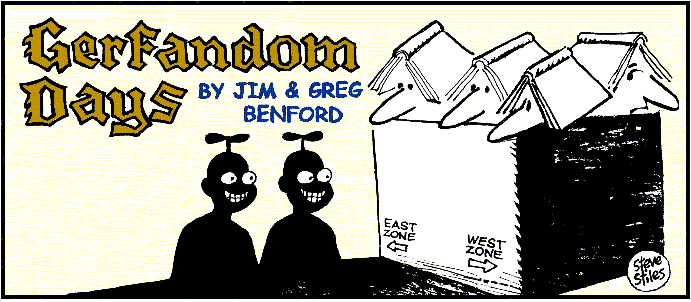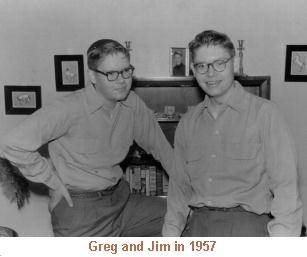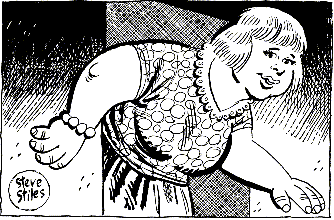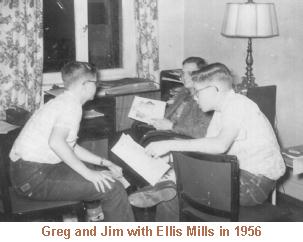 The 1950s has always been the most fascinating era of fandom for us -- it was truly
a Golden Age, when conventions were of manageable size, international ties were
growing, and subfandoms hadn't yet fractured away. It was also a time of FIAWOL,
when fans lived for the next issues of Hyphen, Quandry, and
Shaggy, theorized about "Who sawed Courtney's boat?", were croggled by the
non-existence of Joan W. Carr and Carl Brandon, and campaigned for "South Gate in
`58." Back then, many of today's writers and scientists were fans who had yet to
sell a single word of fiction or conduct a single thought experiment. The next
article is a remembrance from that era, as well as a window onto a fandom that even
today, here in North America, we hear little about, by two fans who have gone on to
much bigger and brighter things.
The 1950s has always been the most fascinating era of fandom for us -- it was truly
a Golden Age, when conventions were of manageable size, international ties were
growing, and subfandoms hadn't yet fractured away. It was also a time of FIAWOL,
when fans lived for the next issues of Hyphen, Quandry, and
Shaggy, theorized about "Who sawed Courtney's boat?", were croggled by the
non-existence of Joan W. Carr and Carl Brandon, and campaigned for "South Gate in
`58." Back then, many of today's writers and scientists were fans who had yet to
sell a single word of fiction or conduct a single thought experiment. The next
article is a remembrance from that era, as well as a window onto a fandom that even
today, here in North America, we hear little about, by two fans who have gone on to
much bigger and brighter things.

Jim
 I have looked back at my collection
of the early Void, produced almost 50 years ago when we were young and the
world was new. There was a great future out there. I look back upon these early
manifestations, our first organized publications. Thinking about 'Gerfandom', the
term now obsolete, I can't help thinking of it as our early origins, early
selves. I have looked back at my collection
of the early Void, produced almost 50 years ago when we were young and the
world was new. There was a great future out there. I look back upon these early
manifestations, our first organized publications. Thinking about 'Gerfandom', the
term now obsolete, I can't help thinking of it as our early origins, early
selves.

 We came to Germany in 1955 and found
it a forbidding land. We produced issues of Void using first hectograph and
later a mimeo. It was a daunting time; there were few fans in Europe and we, having
just come from the U.S., carried a basic fannish viewpoint, which was alien to the
serious SF viewpoint point of the Europeans. We had produced a carbon-copied
zine, Vacuum, at age 13 while still in Atlanta, but the title seemed not
quite right. The issues of Void that we produced as mature 14-year-olds were
in the beginning composed entirely of reviews, in comments written entirely by the
two of us. (On rereading them, they are better now than they seemed at the time.)
In that time, there was a substantial fandom in the U.S. and a burgeoning U.K.
fandom. But on the Continent, all was essentially dark in fannish terms. You have
to remember that the Cold War had succeeded the collapse of European prosperity
during WWII and that living was quite austere. We came to Germany in 1955 and found
it a forbidding land. We produced issues of Void using first hectograph and
later a mimeo. It was a daunting time; there were few fans in Europe and we, having
just come from the U.S., carried a basic fannish viewpoint, which was alien to the
serious SF viewpoint point of the Europeans. We had produced a carbon-copied
zine, Vacuum, at age 13 while still in Atlanta, but the title seemed not
quite right. The issues of Void that we produced as mature 14-year-olds were
in the beginning composed entirely of reviews, in comments written entirely by the
two of us. (On rereading them, they are better now than they seemed at the time.)
In that time, there was a substantial fandom in the U.S. and a burgeoning U.K.
fandom. But on the Continent, all was essentially dark in fannish terms. You have
to remember that the Cold War had succeeded the collapse of European prosperity
during WWII and that living was quite austere.

 We began Void and quickly
obtained lots of articles from British fans like Ron Bennett, Archie Mercer, Walt
Willis, Eric Bentcliffe and John Berry. We quickly got responses from American fans
Terry Carr, Dick Ellington, Dick Geis, Joe Gibson. And then there were the
continentals Julian Parr, Lars Helander, Jan Jansen. The British artists helped --
Arthur Thomson, Eddie Jones, Terry Jeeves. Julian Parr, who was with the British
Foreign Service, was a steady contributor of reviews of European prozines. We began Void and quickly
obtained lots of articles from British fans like Ron Bennett, Archie Mercer, Walt
Willis, Eric Bentcliffe and John Berry. We quickly got responses from American fans
Terry Carr, Dick Ellington, Dick Geis, Joe Gibson. And then there were the
continentals Julian Parr, Lars Helander, Jan Jansen. The British artists helped --
Arthur Thomson, Eddie Jones, Terry Jeeves. Julian Parr, who was with the British
Foreign Service, was a steady contributor of reviews of European prozines.

 We adopted an early European
orientation based on the models of fannish fandom from stateside. It was a unique
experience. Having absorbed fannish attitudes in the U.S. just before we left, we
communi-cated them into Europe. This gave us a basically iconoclastic view of the
somewhat insufferable seriousness of the early German fans such as Walt Ernsting and
Anne Steul. (Germany's leading SF writers were producing 1930s style space opera
epitomized by Perry Rhodan -- like Doc Smith without the style.) We adopted an early European
orientation based on the models of fannish fandom from stateside. It was a unique
experience. Having absorbed fannish attitudes in the U.S. just before we left, we
communi-cated them into Europe. This gave us a basically iconoclastic view of the
somewhat insufferable seriousness of the early German fans such as Walt Ernsting and
Anne Steul. (Germany's leading SF writers were producing 1930s style space opera
epitomized by Perry Rhodan -- like Doc Smith without the style.)


 A fine example of our approach occurs
in Void 6 in Greg's "Deutsch Derogation." The derogation was a form invented
by Boyd Raeburn in his legendary fanzine A Bas. It's a marvelous method of
sending up people, using their own words, and should be reintroduced to fandom. As
Greg said at the introduction, "we will show all of you the real atmosphere of
goodwill in which Gerfandom works and so you might see the real cooperation we have
here." Of course the dialogue among various participants, some quoted from their
works, some made up, shows them to be all self-centered, egocentric, and short
sighted. A bit surprising, then, that German fans were speaking to us after
that. A fine example of our approach occurs
in Void 6 in Greg's "Deutsch Derogation." The derogation was a form invented
by Boyd Raeburn in his legendary fanzine A Bas. It's a marvelous method of
sending up people, using their own words, and should be reintroduced to fandom. As
Greg said at the introduction, "we will show all of you the real atmosphere of
goodwill in which Gerfandom works and so you might see the real cooperation we have
here." Of course the dialogue among various participants, some quoted from their
works, some made up, shows them to be all self-centered, egocentric, and short
sighted. A bit surprising, then, that German fans were speaking to us after
that.

 As usual, the underlying tension was
between the serious forward-looking and the iconoclastic humorous fans. The sercons
were imbued with the feeling that the future was accessible, but only to serious
folks. This is a worldview now largely extinct. The alternative view, which we
held, was that everything was for fun, transient and up for grabs -- the basic
fannish attitude. In all the Voids, this iconoclastic attitude really comes
out. I think that the early Voids encapsulated an attitude in isolation on
the continent that was taken up and carried on by those later to be co-editors of
Void. [One odd feature of this attitude: fannish fans claimed to be a bit
above reading SF, leaving it to the serious types. But we really did read
quite a lot, and cared about it. We were Heinlein fans and thought the future would
belong to those who prepared for it. And that's exactly what we did later in
life.] As usual, the underlying tension was
between the serious forward-looking and the iconoclastic humorous fans. The sercons
were imbued with the feeling that the future was accessible, but only to serious
folks. This is a worldview now largely extinct. The alternative view, which we
held, was that everything was for fun, transient and up for grabs -- the basic
fannish attitude. In all the Voids, this iconoclastic attitude really comes
out. I think that the early Voids encapsulated an attitude in isolation on
the continent that was taken up and carried on by those later to be co-editors of
Void. [One odd feature of this attitude: fannish fans claimed to be a bit
above reading SF, leaving it to the serious types. But we really did read
quite a lot, and cared about it. We were Heinlein fans and thought the future would
belong to those who prepared for it. And that's exactly what we did later in
life.]

 I remember those years in that German
house, maintaining paper contact with like-minded fans thousands of miles away. We
used hecto, then a locally-bought flatbed mimeo, then a Sears Roebuck rotary that
had been mail-ordered from the USA. Fandom and science fiction formed for us a
lifeline and focused our ideas of the world. The early Void was essential to
our development and a lot of fun. We learned many skills in producing something on
schedule. Later, I would use those skills to produce proposals and reports in the
R&D industry. Compared to fanzines, that was easy. In fact, it had a real impact
on my career. Being able to integrate a collection of documents into a coherent
whole, proposals, final reports, etc., was one cause of my rapid advancement in
research. I remember those years in that German
house, maintaining paper contact with like-minded fans thousands of miles away. We
used hecto, then a locally-bought flatbed mimeo, then a Sears Roebuck rotary that
had been mail-ordered from the USA. Fandom and science fiction formed for us a
lifeline and focused our ideas of the world. The early Void was essential to
our development and a lot of fun. We learned many skills in producing something on
schedule. Later, I would use those skills to produce proposals and reports in the
R&D industry. Compared to fanzines, that was easy. In fact, it had a real impact
on my career. Being able to integrate a collection of documents into a coherent
whole, proposals, final reports, etc., was one cause of my rapid advancement in
research.

 Those early days have far more
influence than we realized at the time. After graduate school, Greg and I undertook
our separate careers. I worked in R&D and Greg went on to become a professor.
In recent years, we've begun to work together again and are now working on all sorts
of fascinating things: devising a new form of aero/spacecraft, figuring out what
sort of beacons advanced civilizations could make, doing flight experiments using
beam-driven sails and planning to use beams from Earth hitting spacecraft in orbit
to propel them. Those early days have far more
influence than we realized at the time. After graduate school, Greg and I undertook
our separate careers. I worked in R&D and Greg went on to become a professor.
In recent years, we've begun to work together again and are now working on all sorts
of fascinating things: devising a new form of aero/spacecraft, figuring out what
sort of beacons advanced civilizations could make, doing flight experiments using
beam-driven sails and planning to use beams from Earth hitting spacecraft in orbit
to propel them.

 I wonder what our earlier selves
would have thought of this now-real future? It would've seemed quite fantastic, and
I think those earlier selves would be quite pleased with what we have become. I wonder what our earlier selves
would have thought of this now-real future? It would've seemed quite fantastic, and
I think those earlier selves would be quite pleased with what we have become.

 Greg
Greg
 Hell, we even still belong to an
APA. Hell, we even still belong to an
APA.

 And what became of all those figures?
Julian Parr is retired, still living in Germany. The early SF pros have left the
scene. Jan Jansen immigrated to the U.S. and vanished from fandom. Walter Ernsting,
editor of the first German SF magazine, had come from a dramatic background -- a
soldier captured at Stalingrad, worked in a Gulag camp for five years, then
repatriated. All that, and within a few years he was editing SF! Anne Steul,
energetic and vastly overweight, kept active in fandom, even visiting a UK
convention. (Prompting a Hyphen bacquote, "She Annesteuled herself in the
kitchen.") She died several decades ago. And what became of all those figures?
Julian Parr is retired, still living in Germany. The early SF pros have left the
scene. Jan Jansen immigrated to the U.S. and vanished from fandom. Walter Ernsting,
editor of the first German SF magazine, had come from a dramatic background -- a
soldier captured at Stalingrad, worked in a Gulag camp for five years, then
repatriated. All that, and within a few years he was editing SF! Anne Steul,
energetic and vastly overweight, kept active in fandom, even visiting a UK
convention. (Prompting a Hyphen bacquote, "She Annesteuled herself in the
kitchen.") She died several decades ago.


 That era still lives in Gerfandom
history. Occasionally a German-language fanzine comes in the mail, sometimes with
pictures from that era. Apparently Ellis Mills, the Air Force sergeant who dabbled
in fandom, died in the 1990s. The other American who flashed briefly across the
fannish horizon was Mike Gates, who was in high school with us and caught the bug.
He even published one issue of a fanzine, using the name I gave him, Motley.
Gates was neurotic, high-energy, and ate incessantly. He came over to our house
every day to "fan" (he insisted it was a verb). This led to another Hyphen
bacquote, "We introduced him to fandom and he came over and ate all the crabapples
off our tree." The son of a general, whereas our father was a mere colonel (but a
real combat officer, World War II and Korea, which mattered a lot to us), Gates
always tried to pull rank in his roundabout way, and let everybody know that he was
going to rise fast in the Army when he got the chance. About five years later he
was arrested for impersonating an officer, complete with an accurate uniform. We
never heard from him again. That era still lives in Gerfandom
history. Occasionally a German-language fanzine comes in the mail, sometimes with
pictures from that era. Apparently Ellis Mills, the Air Force sergeant who dabbled
in fandom, died in the 1990s. The other American who flashed briefly across the
fannish horizon was Mike Gates, who was in high school with us and caught the bug.
He even published one issue of a fanzine, using the name I gave him, Motley.
Gates was neurotic, high-energy, and ate incessantly. He came over to our house
every day to "fan" (he insisted it was a verb). This led to another Hyphen
bacquote, "We introduced him to fandom and he came over and ate all the crabapples
off our tree." The son of a general, whereas our father was a mere colonel (but a
real combat officer, World War II and Korea, which mattered a lot to us), Gates
always tried to pull rank in his roundabout way, and let everybody know that he was
going to rise fast in the Army when he got the chance. About five years later he
was arrested for impersonating an officer, complete with an accurate uniform. We
never heard from him again.

 I carried away from the Gerfandom
days an appreciation for the subtleties of writing, for craft and setting scenes.
I learned that I really liked writing -- a skill that led to my taking all my
required university English courses by exam; just write an essay and collect the
credit. I carried away from the Gerfandom
days an appreciation for the subtleties of writing, for craft and setting scenes.
I learned that I really liked writing -- a skill that led to my taking all my
required university English courses by exam; just write an essay and collect the
credit.

 Dad's next assignment was commander
of the National Guard, based in Dallas, and we approached Dallas fandom in the same
spirit, satirizing classic fuggheads like Rich Koogle. By this time we had become
Smartass R Us, and must've been unbearable to the more sober Texas fans. Mercifully,
they looked the other way. Tom Reamy I remember for his saintly reserve. I never
suspected that he would become a major fantasy writer. By that time I was thinking
of pursuing writing as a profession. I went to my father and said, "Dad, I know the
military is a good, solid career, but I want to grow up and become a science fiction
writer." Dad's next assignment was commander
of the National Guard, based in Dallas, and we approached Dallas fandom in the same
spirit, satirizing classic fuggheads like Rich Koogle. By this time we had become
Smartass R Us, and must've been unbearable to the more sober Texas fans. Mercifully,
they looked the other way. Tom Reamy I remember for his saintly reserve. I never
suspected that he would become a major fantasy writer. By that time I was thinking
of pursuing writing as a profession. I went to my father and said, "Dad, I know the
military is a good, solid career, but I want to grow up and become a science fiction
writer."

 He shook his head sadly and replied,
"Sorry, son, but you can't do both." Maybe he was right; I still haven't really
grown up, and that helps while writing fiction. Shortly after that, I read Laura
Fermi's Atoms in the Family, the biography of her famous physicist husband
Enrico, and that changed my life. I saw that you could do science and have a hell
of a lot of pure creative fun. It was certainly a lot easier to aim for than being
the captain of a spaceship. He shook his head sadly and replied,
"Sorry, son, but you can't do both." Maybe he was right; I still haven't really
grown up, and that helps while writing fiction. Shortly after that, I read Laura
Fermi's Atoms in the Family, the biography of her famous physicist husband
Enrico, and that changed my life. I saw that you could do science and have a hell
of a lot of pure creative fun. It was certainly a lot easier to aim for than being
the captain of a spaceship.

 Still, Dallas fans were fun, and we
helped with the first con in Texas, in Dallas 1958. (Having helped run the first
German con in Wetzlar in 1956. This has got to be the most drastic transition in
con-giving annals. We'd learned, though -- and never worked on cons again.) Still, Dallas fans were fun, and we
helped with the first con in Texas, in Dallas 1958. (Having helped run the first
German con in Wetzlar in 1956. This has got to be the most drastic transition in
con-giving annals. We'd learned, though -- and never worked on cons again.)

 We returned to the U.S. in October
1957. On board the America, a classy ship, I was enjoying morning soup
served on deck when the morning's ship newspaper came by. Big headlines about
Sputnik's launch. I recall gasping and running down the deck to find Jim. That
marked the end of an era. For us, the electrifying news brought the dawning
knowledge that we could have careers in science, that the future was opening in a
way SF had foreseen. We returned to the U.S. in October
1957. On board the America, a classy ship, I was enjoying morning soup
served on deck when the morning's ship newspaper came by. Big headlines about
Sputnik's launch. I recall gasping and running down the deck to find Jim. That
marked the end of an era. For us, the electrifying news brought the dawning
knowledge that we could have careers in science, that the future was opening in a
way SF had foreseen.

All illustrations by Steve Stiles
All photos by Eloise Benford
|